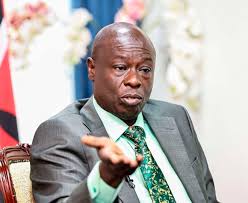NAIROBI, Kenya — In a dramatic escalation of Kenya’s political tensions, former Deputy President Rigathi Gachagua has accused President William Ruto of orchestrating a failed assassination attempt against him during a church service in Gatanga Constituency on Sunday, May 18.
Gachagua claimed that a covert “killer squad” of 101 heavily armed and hooded officers, drawn from elite state security units including the Directorate of Criminal Investigations (DCI), Anti-Terrorism Police Unit (ATPU), General Service Unit (GSU), and Administration Police, was deployed to the area to carry out the mission.
He alleged that the squad was tasked with cordoning off all exits in Gatanga and eliminating him.
In a four-page statement released Monday, Gachagua further claimed that some of the officers intended to plant weapons in his convoy as a pretext for arrest, while a second team trained in biological warfare aimed to poison him using inhaled chemicals that would cause brain paralysis within three months.
He credited his escape to sympathetic officers who tipped off his team.
“We received further intel from deployed patriotic officers who were not in agreement with the evil mission,” he said, explaining that his team used alternative routes to evade the cordon.
Gachagua’s allegations come months after his dramatic fallout with President Ruto. Once close allies and running mates in the 2022 general elections under the United Democratic Alliance (UDA), their relationship soured publicly in late 2023 over issues of power-sharing, economic policy, and alleged sidelining of Mt.
Kenya interests in government appointments. By early 2024, Gachagua had openly criticized Ruto’s administration and resigned from UDA.
In November 2024, he launched the Democratic Change Party (DCP), positioning himself as a reformist alternative and vowing to champion constitutionalism, electoral justice, and regional equity.
His presidential ambitions for 2027 have placed him on a collision course with Ruto’s inner circle, triggering political tensions that have since spilled over into violence, according to the former deputy president.
Gachagua catalogued a series of violent incidents he says targeted him and his supporters since his split from government. These include alleged attacks by organized criminal gangs during events in Limuru, Nyandarua, Nyeri, Naivasha, and Nairobi between November 2024 and April 2025.
In each case, he claims the attackers operated with police support or complicity, but no investigations or prosecutions have followed.
“Not a single case has been prosecuted,” he said, accusing the Ministry of Interior of enabling impunity.
He also accused President Ruto of seeking revenge over his reminders of the 2007/08 Kiambaa Church massacre, a dark chapter of post-election violence, and exposing the alleged illegal grabbing of five acres of Ngong Forest to build a private hotel.
Gachagua warned that attempts to disarm his licensed private security personnel are aimed at making him vulnerable to assassination.
“We have credible information that President Ruto has directed that my private security personnel be disarmed to allow room for goons to attack and kill me,” he wrote.
In a final declaration of defiance, Gachagua vowed not to be silenced:
“Let me assure the planners of this violence that you will not stop the cause of the people of Kenya; the one-term regime must end.”
At the time of publication, there has been no official response from State House or the Ministry of Interior.
However, Gachagua’s allegations are expected to send shockwaves through Kenya’s political establishment and reignite debate over the state’s use of force and security organs in political disputes.





